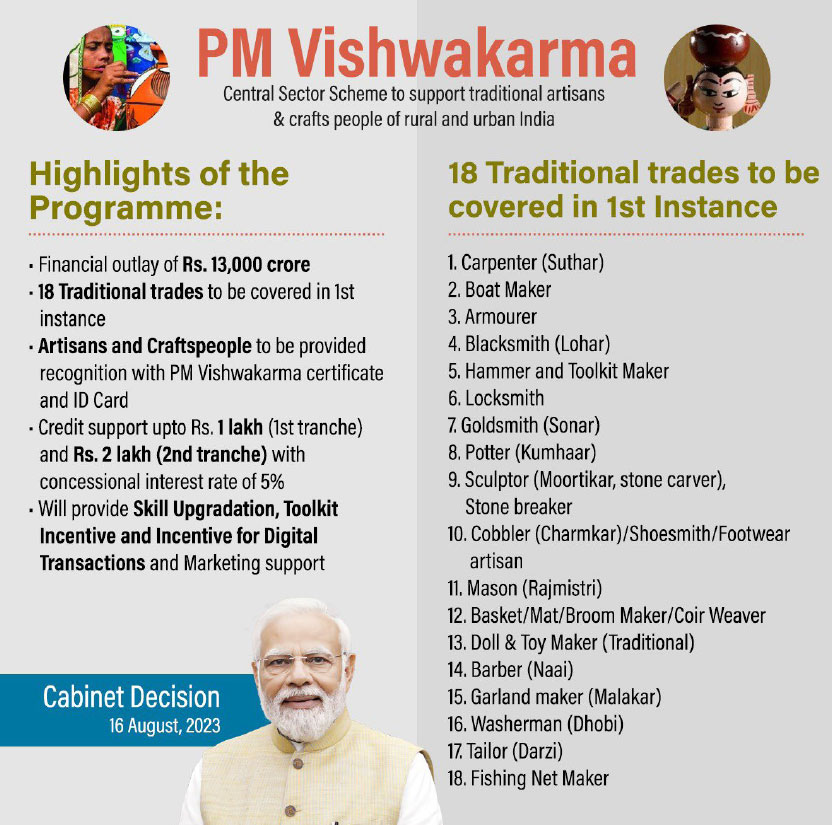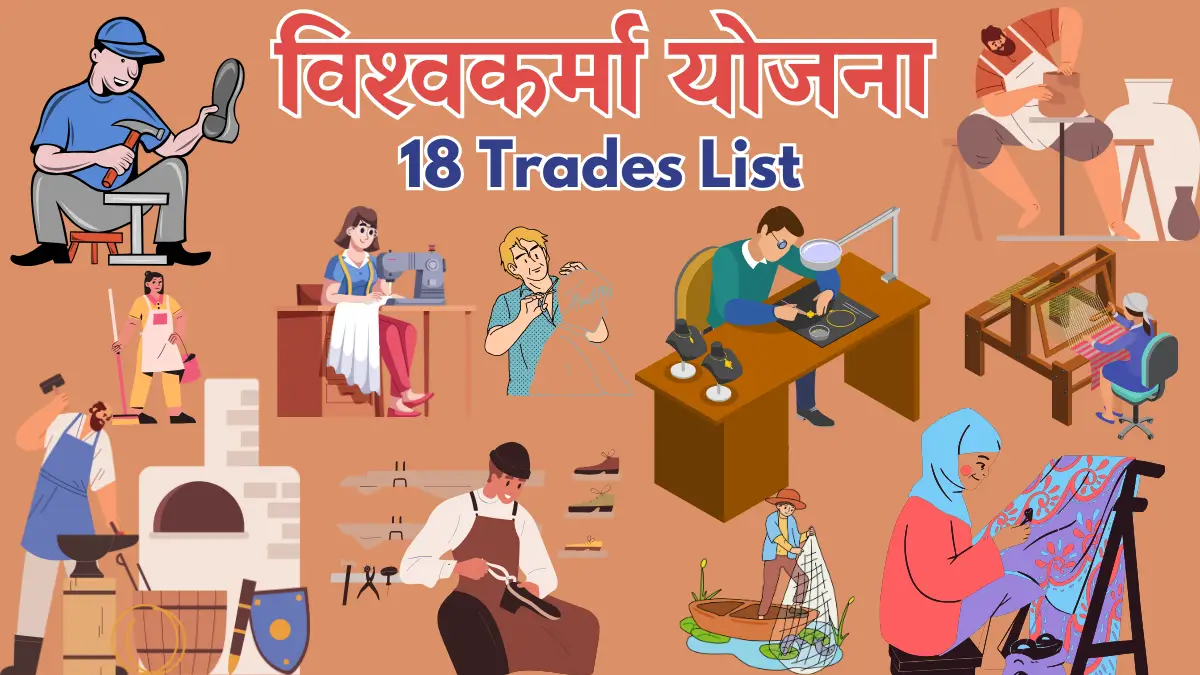प्रधानमंत्री विश्वकर्मा योजना के लिए कौन आवेदन कर सकता है? कौन कौन लोग इस योजना का लाभ उठाने के पात्र हैं? जानिए PM विश्वकर्मा योजना की 18 trades की लिस्ट जिनके तहत शामिल कारीगर या शिल्पकार इस योजना के तहत सस्ती ब्याज दरों वाला ऋण लाभ और ट्रैनिंग लेने के लिए आवेदन सकते हैं।
Vishwakarma Yojana Eligibility Criteria (विश्वकर्मा योजना पात्रता मानदंड)
इस लेख में आज हम जानेंगे विश्वकर्मा योजना के पात्रता मानदंडों अथवा Eligibility Criteria के बारे में।
- विश्वकर्मा योजना पूरे भारत में 18 व्यवसायों से जुड़े शिल्पकारों और कारीगरों के लिए शुरू की गई है। इस योजना का लाभ उठाने के लिए कारीगर या शिल्पकार का इस 18 कैटेगरी में से किसी एक से जुड़ा होना आवश्यक है और यह एक मुख्य पात्रता मानदंड है।
- यह योजना पूरे भारत में ग्रामीण और शहरी क्षेत्रों के कारीगरों व शिल्पकारों को सहायता प्रदान करेगी।
- पीएम विश्वकर्मा योजना के तहत, कारीगरों और शिल्पकारों को पीएम विश्वकर्मा प्रमाणपत्र और पहचानपत्र के माध्यम से मान्यता प्रदान की जाएगी
- 5 प्रतिशत की रियायती ब्याज दर के साथ 1 लाख रुपये (पहली किश्त) और 2 लाख रुपये (दूसरी किश्त) तक ऋण सहायता प्रदान की जाएगी।
- इस योजना के तहत कौशल Training, टूलकिट प्रोत्साहन, डिजिटल लेन-देन के लिए प्रोत्साहन और Marketing सहायता प्रदान की जाएगी।
Eligibility Criteria for PM Vishwakarma Yojana 2025
- An artisan or crafts person working with hands and tools and engaged in one of the 18 family-based traditional trades mentioned in the scheme, in unorganized sector on self-employment basis, shall be eligible for registration under PM Vishwakarma.
- The minimum age of the beneficiary should be 18 years on the date of registration.
- The beneficiary should be engaged in the concerned trade on the date of registration and should not have availed loans under similar credit-based schemes of Central Government or State Government for self-employment/ business development, e.g. PMEGP, PM SVANidhi, Mudra, in the past 5 years.
- The registration and benefits under the Scheme shall be restricted to one member of the family. For availing benefits under the Scheme, a ‘family’ is defined as consisting of the husband, wife and unmarried children.
- A person in government service and their family members shall not be eligible under the Scheme.
PM Vishwakarma Yojana Online Apply
PM Vishwakarma Yojana 18 Trade List – 18 कैटेगरी लिस्ट
पीएम विश्वकर्मा के तहत पहले चरण में 18 पारंपरिक व्यवसायों को शामिल किया जाएगा। इन व्यवसायों की लिस्ट इस प्रकार है।
- बढ़ई (सुथार)
- नाव निर्माता
- अस्त्र बनाने वाला
- लोहार
- हथौड़ा और टूल किट निर्माता
- ताला बनाने वाला
- गोल्डस्मिथ (सुनार)
- कुम्हार
- मूर्तिकार (पत्थर तराशने वाला, पत्थर तोड़ने वाला)
- मोची (चर्मकार)/जूता कारीगर
- मेसन (राजमिस्त्री)
- टोकरी/चटाई/झाड़ू निर्माता/जूट बुनकर
- गुड़िया और खिलौना निर्माता (पारंपरिक)
- नाई
- माला बनाने वाला
- धोबी
- दर्जी
- मछली पकड़ने का जाल बनाने वाला
PM Vishwakarma 18 Trade List with Details
| S. No. | Trade Name | Description |
|---|---|---|
| 1 | Carpenter (Suthar/Badhai) | Self-employed artisans and craftspeople who work with their hands and tools to make/assemble wooden products or alter/repair wooden fixtures, mostly engaged in traditional/unorganized sector. |
| 2 | Blacksmith (Lohar) | Self-employed artisans and craftspeople, including blacksmiths, copper-smiths, and bronze-smiths, who work with their hands and tools to forge metals like iron, copper, brass, or bronze to get the required shape and size by heating, bending, hammering, etc. to create products in the unorganized sector. |
| 3 | Boat Maker | Self-employed artisans and craftspeople who work with their hands and tools to make, assemble, alter, and/or repair wooden boats in the unorganized sector. |
| 4 | Armourer | Self-employed artisans and craftspeople who manufacture, repair, or service various types of arms like swords, shields, knives, helmets, etc., using hands and traditional tools employed in the unorganized sector. |
| 5 | Hammer and Tool Kit Maker | Self-employed artisans and craftspeople who work with their hands and tools to forge metals like iron to get the required shape and size by heating, bending, hammering, etc., to create hammer and tools in the unorganized sector. |
| 6 | Locksmith | Self-employed artisans and craftspeople found in small roadside stalls or traveling in streets who use hands and traditional tools like cutters, hammers, needles, threads, etc., in the unorganized sector to assemble, install, and repair locks. |
| 7 | Goldsmith (Sonar) | Self-employed goldsmiths/sonar/swarnakars, silversmiths are the artisans and craftspeople who work with their hands and tools to create and design intricate jewellery and ornamental pieces with gold and other precious metals in the unorganized sector. |
| 8 | Sculptor (Moortikar, Stone Carver), Stone Breaker | Self-employed artisans and craftspeople, also known as Shilpis or Moortikars, who work with their hands and tools to carve, break, or shape stones into three-dimensional artworks in the unorganized sector. |
| 9 | Potter (Kumhaar) | Self-employed artisans and craftspeople who work with their hands and tools to create pottery articles by moulding clay on a wheel and baking them in a kiln using traditional methods in the unorganized sector. |
| 10 | Cobbler (Charmakar) / Shoesmith / Footwear Artisan | Self-employed artisans found in small roadside stalls or travelling in streets who use hands and traditional tools like cutters, hammers, needles, threads, etc., to manufacture, repair, restore, and modify footwear. |
| 11 | Basket/Mat/Broom Maker/Coir Weaver | Self-employed artisans and craftspeople who weave pliable materials to make different types of baskets in the unorganized sector. Broom Makers process bristles from grass or plants like coconut to make brooms. Coir Weavers use coir and bamboo materials to make items such as Baskets and Mats. |
| 12 | Mason (Rajmistri) | Artisans and craftspeople who work with their hands and tools to perform works such as constructing structures using bricks/blocks, plastering, cementing, and waterproofing, mostly in the unorganized sector. These artisans are also known as Rajmistris. |
| 13 | Barber (Naai) | Self-employed artisans and craftspeople who work with their hands using scissors, blades, combs, shaving creams, etc. to provide grooming services, primarily hair cutting and shaving, in the unorganized sector. |
| 14 | Doll & Toy Maker (Traditional) | Self-employed artisans and craftspeople who work with their hands and tools to make Dolls and Toys by using materials such as wool, threads, cotton, wood, etc., in the unorganized sector. |
| 15 | Garland Maker (Malakaar) | Self-employed artisans who work with their hands to create decorative garlands made of flowers, leaves, or other materials for use at rituals, cultural, or ceremonial occasions. They meticulously arrange and string together these elements, often incorporating different colours and textures. |
| 16 | Washerman (Dhobi) | Self-employed artisans and craftspeople who work with their hands to provide services such as washing and ironing clothes. They primarily use manual washing techniques, local soaps, wooden sticks (‘thapi’), and coal-based irons in the unorganized sector. |
| 17 | Tailor (Darzi) | Self-employed artisans and craftspeople who work with sewing machines, scissors, buttons, fabrics, threads, needles, etc., to stitch and alter various dresses/garments in the unorganized sector. |
| 18 | Fishing Net Maker | Self-employed artisans and craftspeople who craft fishing nets using various materials like ropes, twines, or threads. They employ traditional techniques or modern machinery to weave and knot the nets into specific designs and sizes, ensuring they are strong and durable for catching fish and other aquatic creatures. |

इस योजना को भारत सरकार के सूक्ष्म, लघु एवं मध्यम उद्यम मंत्रालय के द्वारा संचालित किया जा रहा है।
यह वेबसाईट विश्वकर्मा योजना की आधिकारिक वेबसाईट नहीं है और ना ही इसका किसी सरकारी विभाग, या अधिकारी से किसी प्रकार का कोई संबंध या लेना देना है। यह वेबसाईट बस विश्वकर्मा योजना के बारे में जानकारी देने के लिए बनायी गई है।
योजना की आधिकारी वेबसाईट https://pmvishwakarma.gov.in है।

I am doing a carpentry business without financial facility to develop my business and you help me financially I will develop the business
Yes
I am doing carpentry
Vishwakarma Yojana
Pm Vishwakarma Yojana
Visksrma yojna
Salon
pm vishawakarma yojna kushinagr me kab suru hoga
Please provide
I m handicapped 45% i am civil contrator but last 2 years i have noany work
i have good knoweladge construction work my totalexperinace is more than 10 years plz i have no money for work plz guide me for handicapped person plz inform me for financially help
Zindagi me apne dam pe aage badhna hoga
.. bhool jao ki sarkaar madad degi … Zindagi bewafa hai , par koi baat nhi… Khud par vishwaas rakh kar… Koi bhi kaam chota bada karne ki koshish karo… Safalta thodi thodi hi sahi par milegi👍👍
HOW CAN WE CHECK ELIGIBILITY OF
Tailor (Darzi) Self-employed artisans and craftspeople who work with sewing machines, scissors, buttons, fabrics, threads, needles, etc., to stitch and alter various dresses/garments in the unorganized sector.
already applied
krishna yadav
mp/017/250694/15214101
application no.
track and status confirm pls
Mera naam vivek Vishwakarma he or me carpenter hu Vishwakarma Yojana
Ka tuls nhi mila he mujhe
I’m doing carpanter work I have to develop my working skill have some machine and worker also
M in 18 Trade m s koi bhi kam nhi krta hu.. koi 1 Trade Select krke M kam ko sikhna chahta hu… Kya m form bhr skra hu btaye plz
Pm viwakarma me form apply Kiya tha abhi tak koi massage nahi aaya hai
Plz halp free mishon. hose wife